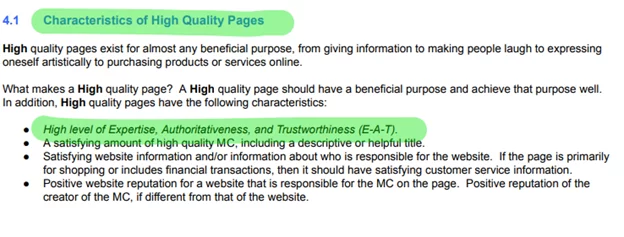SEO (search engine optimization) has always been an evolving field, and the rate of change has increased dramatically over the past few years. Some trends have lasted longer than others, but it’s impossible to know what will stick and what will fall out of favor over the next few years. Luckily,
There are several current trends that are still likely to remain influential in search engine optimization over the next five years—and you can get ahead of the curve by keeping these five strategies in mind as you design your website and content strategy.
Core Web Vitals as a Google ranking factor
Google is doing more and more with machine learning and artificial intelligence. The company has been investing heavily in products like RankBrain, but it’s not just one-off experiments. Much of Google’s overall algorithm is already based on machine learning and AI, including core ranking factors like content length, domain reputation, site speed, etc.
To stay ahead of Google’s continuous changes (or get a jump-start on its next wave), consider focusing on your core web vitals that can also help you build a better site for your visitors. There are many resources available on what these factors are, how they work and how to improve them.
Name three Core Web Vitals and why they matter for ranking well: You need at least 1 sentence per factor. A paragraph will suffice if you have an example from your own experience where each ranking factor mattered significantly for ranking well in Google’s search results.
Google’s BERT looks for intent matches
Google has introduced a new type of search algorithm that will make it easier for users to find what they are looking for. It’s called BERT, and Google says it is designed specifically to process conversational searches—for example, where is my bank? or show me photos of Washington DC. Google says BERT will make a site appear higher in search results when there is a good match between user intent and page content.
That means authors need to change their strategy away from keyword stuffing and towards creating content that discusses how specific problems can be solved. Optimizing content around clear, actionable ideas could not only lead to an increase in traffic but also an increase in engagement with brands on social media platforms such as Facebook and Twitter.
How to optimize for Google’s BERT
BERT stands for Bidirectional Encoder Representations from Transformers, a new machine learning model that has been making waves recently among researchers and Google engineers. BERT (and other related models) is used in Natural Language Processing (NLP) applications like Question Answering (QA), Machine Translation, and Paraphrase detection. It’s capable of capturing syntactic and semantic information at once — with each additional character reducing its accuracy.
This means it’s ideal for Machine Comprehension tasks like QA or summarization but suffers when dealing with long text such as paragraph answering. If you want to stay ahead of your competition, keep an eye on BERT because it will likely become part of Google’s main ranking algorithm.
The challenge here is getting accurate data sets for training, which can be tricky since public datasets are usually small and private datasets are often hard to get access to. You might have better luck finding a data scientist willing to collaborate.
The upside? You can use their research papers as sources of inspiration while they do all the heavy lifting! As an added bonus, they may even be able to provide insight into how these models work under-the-hood which can help improve your own NLP pipeline.
Keyword research will become more important
In a world where Google is getting better at delivering relevant search results and artificial intelligence (AI) is becoming increasingly prominent, keyword research will become more important than ever. Using AI-optimized keyword research methods will help ensure that your SEO efforts are targeted and effective.
A good place to start? Google business listings, which provide access to valuable data about online users. With free tools like Google Keyword Planner, SEMrush or Wordstream , you can harness massive amounts of raw data about popular keywords on a global scale and make it work for you. All you need is a little bit of creativity when organizing all that information.
Google still wants original content
To remain competitive, search engines want to reward original content and punish sites that don’t use credible information. Using keyword research, you can predict what terms you should target, but also what terms aren’t worth your time. Don’t rely on Google for business listings: Using Google for your business listing is a good idea until it becomes a bad one. Google wants people who are actually connected with your brand or your product—not just random customers writing reviews about things they bought from Amazon.
Voice search and chatbots
Gone are the days where businesses have to hope for people to come find them. Instead, it’s up to you (the business) to deliver your content where customers want it. In fact, a recent study found that 55% of consumers prefer having access to products and services via natural language processing (NLP) technology—and that number is only growing with each year.
As voice search and NLP technology become increasingly accessible over time, expect both keywords and keyword research as a concept itself to evolve and shift accordingly in order for businesses, brands, marketers and even writers themselves stay ahead of all trends on both an emotional and functional level.
Artificial intelligence
In February, Google made headlines when it announced a new feature for its Chrome browser that would let users set time limits on websites based on how long they have been active. For instance, if you spend too much time browsing Facebook and less time working, your computer will eventually limit access to Facebook after you’ve lingered too long. Over time, AI is expected to get even smarter—and more intrusive.
Video marketing
Google has made big strides with its YouTube platform. Not only is it one of Google’s most popular properties, but it also represents a huge opportunity for brands and marketers. Optimizing your videos for YouTube will let you grow your visibility and get ahead of some key SEO trends that are just around the corner.
Here are five strategies to consider when optimizing your video content for YouTube. The three best ways to optimize your videos for YouTube include using tags effectively, keeping video titles simple and informative, and focusing on user experience by including relevant keywords throughout your videos. The tips above should help you maximize exposure on YouTube—and beyond—so be sure to incorporate them into your strategy as soon as possible!
Featured Snippets
More search engine users are using featured snippets than ever before—and they may soon be a very critical part of your marketing strategy. Featured snippets are essentially direct answers to frequently asked questions that appear on Google’s top results page and mobile search pages. And because these answers come directly from Google, they can greatly improve user experience. Search Engine Journal has created an infographic describing how featured snippets work, how you can get them, and what they mean for your business.
Influencer SEO
One way to be at least a little bit ahead of your competition is to spend time figuring out what your competition hasn’t figured out. A good place to start? To find out which keywords are being searched for but not yet dominated by anyone.  The best way to do that is with keyword research. Google Keyword Planner (or another keyword research tool) can help you figure out which keywords have high search volume and low competition, allowing you to make sure that when people search for those terms, they land on your site instead of someone else’s.
The best way to do that is with keyword research. Google Keyword Planner (or another keyword research tool) can help you figure out which keywords have high search volume and low competition, allowing you to make sure that when people search for those terms, they land on your site instead of someone else’s.
EAT & branded SEO
If you don’t believe that EAT and branded keywords are on their way out, take a look at Google. Here is what they said about keyword stuffing and using brand keywords as search terms – which was a huge part of organic SEO for many years, Today we announced an update to our Search Quality Rater Guidelines with explicit instructions for raters on how to identify low-quality sites.
Today we announced an update to our Search Quality Rater Guidelines with explicit instructions for raters on how to identify low-quality sites.
The new guidelines, among other things, address keyword stuffing and branded searches. Websites should avoid overuse of keywords, don’t use ambiguous or generic terms as your only source of search terms and think about what a searcher’s query was when writing your web page headlines.




